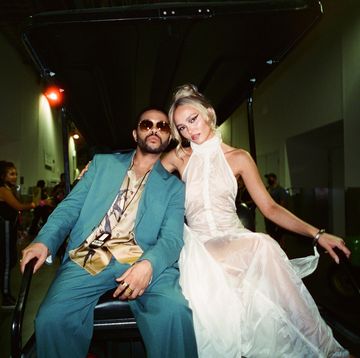Netflix’s critically-acclaimed The Staircase is more than a murder mystery. It’s an enlightening (and often bewildering) case study of the US justice system, and all of its corruptions, imprecisions and eccentricities.
But how would Michael Peterson’s controversial, heavily-publicised court battle have played out differently on our shores? To find out, we turned to Twitter’s resident law boffin The Secret Barrister…
Media Coverage
“One of the most jarring aspects of the series as an English lawyer is how every US news anchor reports on the trial like a pub bore, speculating wildly as they spit out their worthless opinions. A criminal trial, which ultimately determines this man's liberty, is treated like light entertainment.
“It's clear that even the reporters supposedly in court watching the evidence manage to misunderstand and misreport it, so how any sort of informed debate is supposed to take place is a mystery.
“Contempt laws mean that commentators in England and Wales tread very, very carefully before offering any sort of comment on ongoing trials; for safety, most sensibly remain silent until the verdict is in. Some high profile figures have had their fingers burned. Rod Liddle nearly caused the collapse of the trial of Stephen Lawrence's murderers in 2012 by writing an ill-judged opinion piece in The Spectator, for which the magazine was fined. More recently, ex-EDL leader Tommy Robinson has learned the hard way how seriously the courts treat contempts of court.
“There would not be any interviews with the advocates involved – barristers generally refrain from discussing ongoing cases with the media – and absolutely no prime time TV shows salaciously picking over the bones of the day's events and speculating over whether Peterson did it.”
Defence and prosecution
“Prosecutors act differently in the UK. Over here, there's a solemnity and dignity in prosecuting, and an adherence to fair play, which appears entirely absent in the US.
“We don't elect prosecutors or glamourise "toughness"; the English and Welsh Bar is independent, and prosecuting barristers eschew the "win at all costs" mentality that prevails across the water. It is not the job of prosecutors here to push for the longest sentence possible, for example; we fight the trial fiercely but fairly, conscious that if we don't, people can be wrongly convicted.
“The language and formalities in court also differ. Aside from the dress - no wigs and gowns in the States - the way in which the advocates address the judge is informal compared to the rigid over-politeness and outmoded jargon that barristers in Crown Courts are trained to deploy.”
Forensics
“The defence and prosecution are each entitled to rely on expert evidence, but procedural rules require that the parties narrow the issues to keep the expert evidence straightforward. Prosecution and defence experts will each produce a report which is served on all parties, and will usually meet in advance of the trial to discuss their respective reports and draw up a list of areas of agreement and disagreement. This ensures that, at trial, everybody knows what to focus on.”
Documentary team
“There's nothing to stop a camera team following a defence team for the duration of a court case, with the defence's permission, but the cameras would have to start and stop rolling at the court doors.
“Section 41 of the Criminal Justice Act 1925 makes it a criminal offence to take any photograph or make any image (including drawings - court sketch artists have to rush outside the courtroom and draw the scene from memory) inside a court building.
"There are gradual moves to opening courts up to TV cameras - the Supreme Court and Court of Appeal are now often televised, and there have been rumblings about piloting a broadcast of sentencing hearings in the Crown Courts - but we're still a world away from 24/7 US-style broadcasts.
“It's a tricky one - justice should be open, and the quickest way to opening up the courts is to allow streaming and broadcasting. But there are real fears that doing so would deter witnesses and victims of crime, many of whom are already terrified about the prospect of appearing in court, from participating, or even reporting crime.
“The balance we strike is to allow any members of the public to sit in and watch, and for the press to report fairly and accurately, but to stop short of full broadcasts. All Crown Court proceedings are also audio-recorded, so there is a full record of everything that happens in court.”
Inadmissible Evidence
“The stand-out piece for me was the evidence of the (admittedly charming) Brad and the history of Peterson's alleged sexual infidelity.
"Even if - which is a stretch - evidence of his infidelity could be relevant to establishing a motive for murder, such as an argument upon Kathleen finding out, there is no way on earth that former partners would be called to give explicit evidence of the sexual activities engaged in, nor that emails between them containing pornographic language and images would have been given to the jury.
“The probative value of this - particularly when Peterson himself admitted the relationships - is nil; it is purely prejudicial. Even if, somehow, a court agreed that it was relevant and therefore theoretically admissible, that wouldn't be the end of it: our courts have the power (section 78 of the Police and Criminal Evidence Act 1984, since you ask) to exclude any prosecution evidence which has such an adverse effect on the fairness of proceedings that the court ought not to admit it. In short, any prosecutor conducting a trial like this District Attorney would find that they don't have much of a case left.”
Would they dig up the body in Germany?
"Given that there was already a pathologist's report which appeared to confirm the death as unsuspicious, there would need to be a pretty good reason - some sort of major deficiency in that report - for the prosecution to go behind the report's conclusion and disinter a body in the hope of identifying a new cause of death.
"My reading of The Staircase - and it may be that something was lost in editing - was that the prosecution was pursuing highly speculative lines of enquiry which I wouldn't expect to be pursued in England and Wales. But even if the police and Crown Prosecution Service did, there would absolutely not be rolling news coverage of the event allowing the prosecution to generate a public frenzy in the weeks prior to trial."
The Secret Barrister is a junior criminal barrister and the author of the Sunday Times bestseller The Secret Barrister: Stories of The Law and How It's Broken














